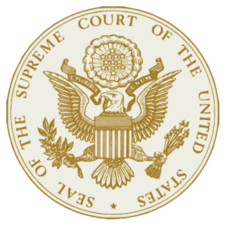Heart of Atlanta Motel, Inc. v. U.S.
 | |
| Heart of Atlanta Motel, Inc. v. United States | |
| Reference: 379 US 241 | |
| Term: 1964 | |
| Important Dates | |
| Argued: Oct 5, 1964 Decided: Dec 14, 1964 | |
| Outcome | |
| The United States District Court for the Northern District of Georgia affirmed | |
| Majority | |
| Earl Warren • William Douglas • William Brennan • Hugo Black • Arthur Goldberg • Byron White • Potter Stewart • Tom Clark • John Harlan | |
Heart of Atlanta Motel, Inc. v. United States is a case decided on Dec 14, 1964, by the United States Supreme Court affirming that the Commerce Clause extends the anti-discrimination provisions in the Civil Rights Act of 1964 to apply to hotels that host interstate visitors. The Supreme Court affirmed the ruling of the United States District Court for the Northern District of Georgia.[1]
Why it matters: The Supreme Court's decision in this case found that the Civil Rights Act of 1964 lawfully prohibits hotels that host interstate travelers from discriminating on the basis of race under the Commerce Clause. To read more about the impact of Heart of Atlanta Motel, Inc. v. United States click here.
Background
Prior to the passage of the Civil Rights Act of 1964, the Heart of Atlanta Motel owner established a policy that restricted the motel to only host white people, three-fourths of whom were interstate travelers. Following the enactment of the Civil Rights Act of 1964, the Heart of Atlanta Motel Inc. sued the United States for declaratory relief and to prohibit the enforcement of the law, which required the motel to also rent rooms to non-white guests. The hotel owner claimed in part that the act exceeded Congress’ authority to regulate interstate commerce under the Commerce Clause.
A three-judge panel of the district court upheld the constitutionality of Title II, §§ 201(a), (b)(1) and (c)(1) of the Civil Rights Act of 1964, which comprised the right to enjoy public accommodations without discrimination. The ruling prohibited the Heart of Atlanta Motel from refusing to accommodate Black guests for racial reasons.[2]
Oral argument
Oral argument was held on Oct 5, 1964. The case was decided on Dec 14, 1964.[1]
Decision
The Supreme Court decided 9-0 to affirm the decision of the United States District Court for the Northern District of Georgia. Justice Tom Clark delivered the opinion of the court, joined by Justices Earl Warren, William Brennan, Byron White, Potter Stewart, Tom Clark, and John Harlan. Justice Hugo Black, joined by Justices William Douglas and Arthur Goldberg wrote a concurring opinion.[2]
Opinions
Opinion of the court
Justice Tom Clark, writing for the court, argued that Congress has the authority to prohibit the Heart of Atlanta Motel from discriminating based on race under the Commerce Clause:[2]
| “ | We therefore conclude that the action of the Congress in the adoption of the Act as applied here to a motel which concededly serves interstate travelers is within the power granted it by the Commerce Clause of the Constitution, as interpreted by this Court for 140 years. It may be argued that Congress could have pursued other methods to eliminate the obstructions it found in interstate commerce caused by racial discrimination. But this is a matter of policy that rests entirely with the Congress, not with the courts.[3] | ” |
| —Tom Clark, majority opinion in Heart of Atlanta Motel, Inc. v. United States[2] | ||
Concurring opinion
Justice Hugo Black, joined by Justices William Douglas and Arthur Goldberg wrote a concurring opinion, agreeing that the government could prohibit the motel from discriminating on the basis of race under the Commerce Clause:
| “ | I recognize that every remote, possible, speculative effect on commerce should not be accepted as an adequate constitutional ground to uproot and throw into the discard all our traditional distinctions between what is purely local, and therefore controlled by state laws, and what affects the national interest and is therefore subject to control by federal laws. I recognize too that some isolated and remote lunchroom which sells only to local people and buys almost all its supplies in the locality may possibly be beyond the reach of the power of Congress to regulate commerce, just as such an establishment is not covered by the present Act. But, in deciding the constitutional power of Congress in cases like the two before us, we do not consider the effect on interstate commerce of only one isolated, individual, local event, without regard to the fact that this single local event, when added to many others of a similar nature, may impose a burden on interstate commerce by reducing its volume or distorting its flow.[3] | ” |
| —Hugo Black, concurring opinion in Heart of Atlanta Motel, Inc. v. United States[2] | ||
Impact
| Federalism |
|---|
| •Key terms • Court cases •Major arguments • State responses to federal mandates • Federalism by the numbers • Index of articles about federalism |
Heart of Atlanta Motel, Inc. v. United States established that Title II of the Civil Rights Act of 1964 forbids racial discrimination in settings of public accommodation if their operations impact interstate commerce.[1][2]
See also
External links
- Full text of case syllabus and opinions (Justia)
- Supreme Court of the United States
- Search Google News for this topic
Footnotes
- ↑ 1.0 1.1 1.2 Oyez, "Heart of Atlanta Motel, Inc. v. United States", accessed July 18, 2022
- ↑ 2.0 2.1 2.2 2.3 2.4 2.5 Justia, "Heart of Atlanta Motel, Inc. v. United States, 379 U.S. 241 (1964)" accessed July 18, 2022
- ↑ 3.0 3.1 Note: This text is quoted verbatim from the original source. Any inconsistencies are attributable to the original source.
| |||||